必修一Unit 2 English around the world warming up, reading and language points课件(34张ppt)
文档属性
| 名称 | 必修一Unit 2 English around the world warming up, reading and language points课件(34张ppt) |
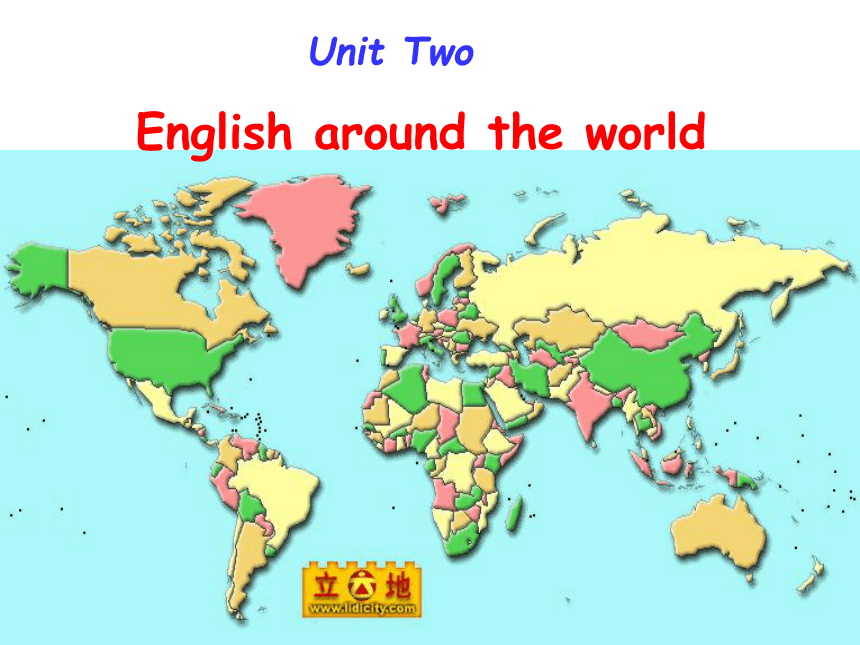
|
|
| 格式 | zip | ||
| 文件大小 | 1.3MB | ||
| 资源类型 | 教案 | ||
| 版本资源 | 人教版(新课程标准) | ||
| 科目 | 英语 | ||
| 更新时间 | 2020-12-14 00:00:00 | ||
图片预览

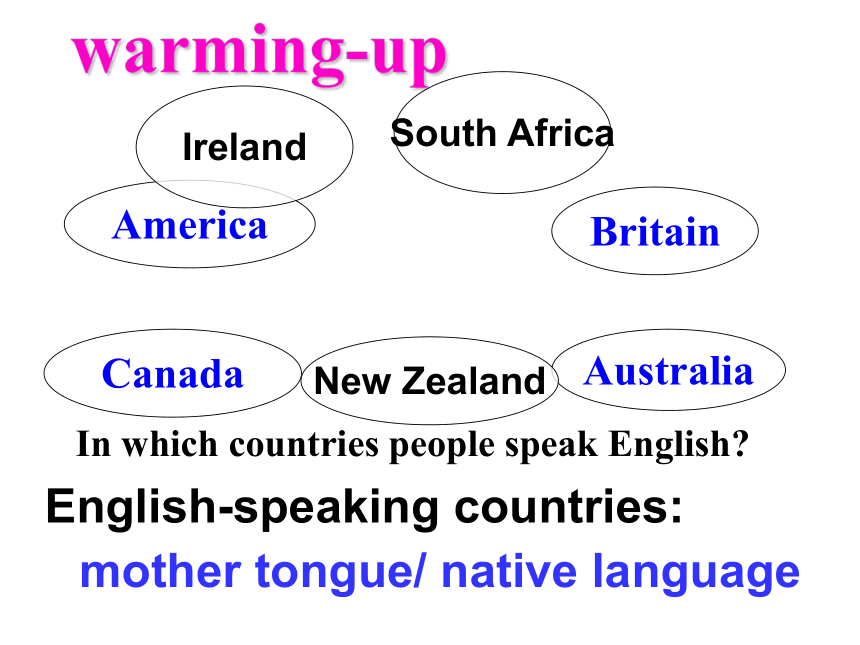
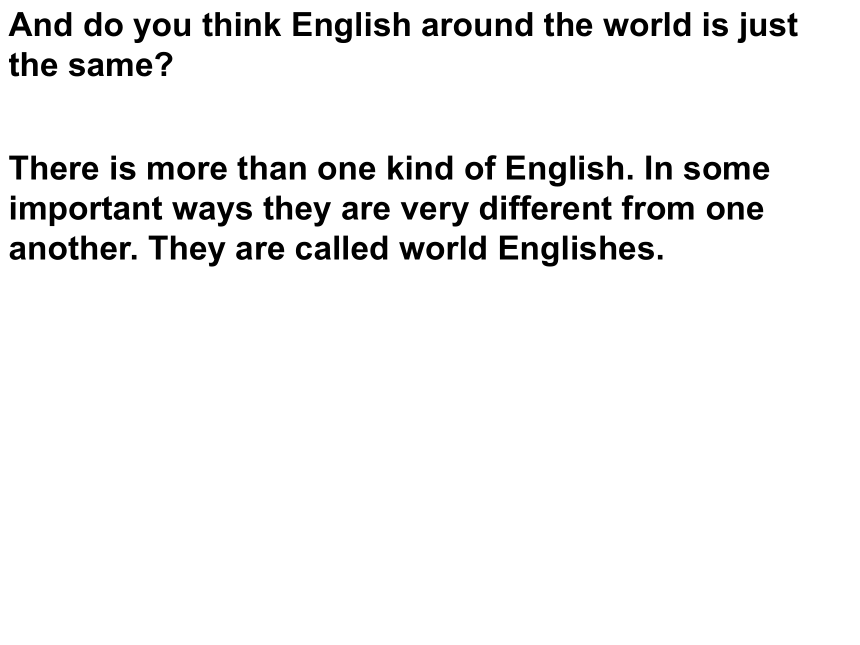
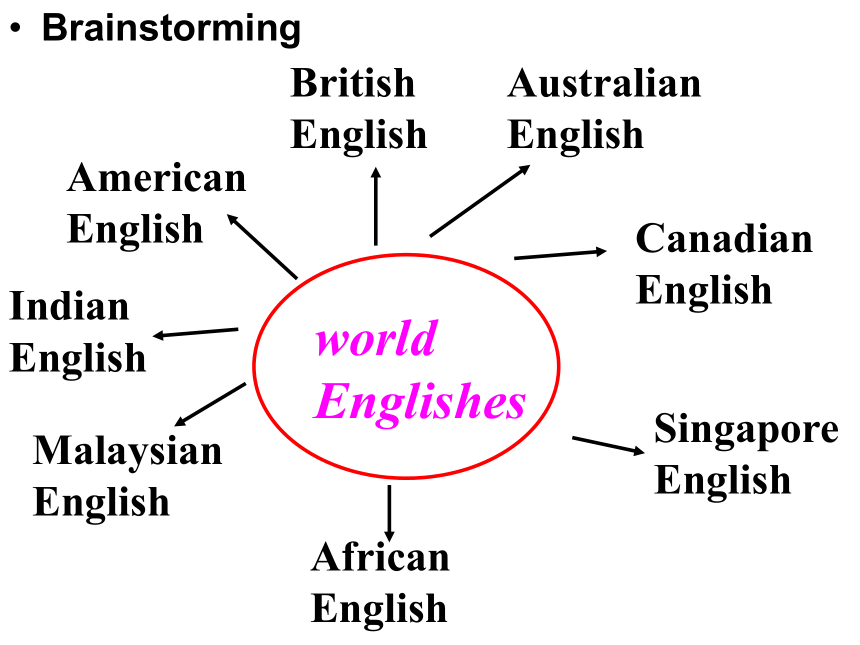
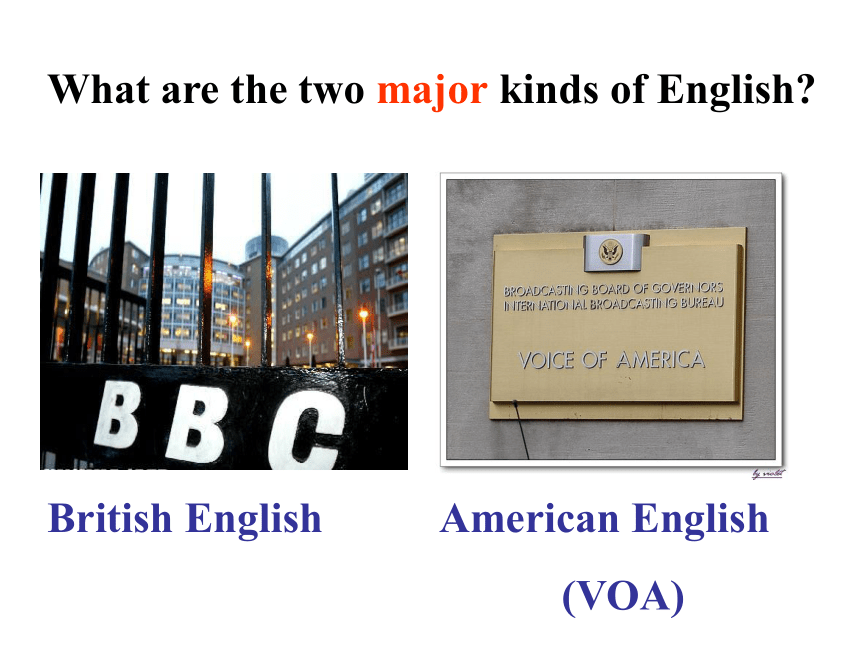
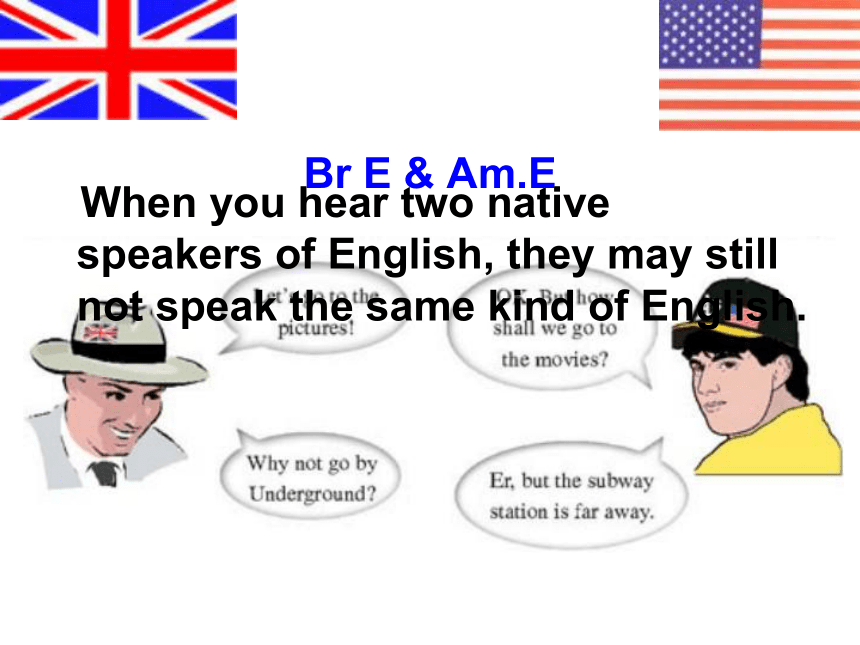
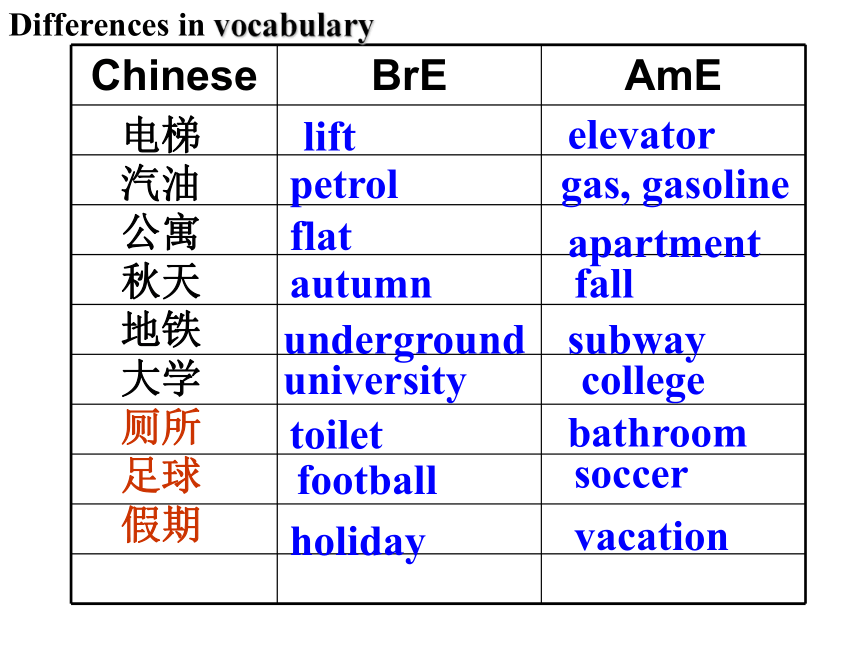
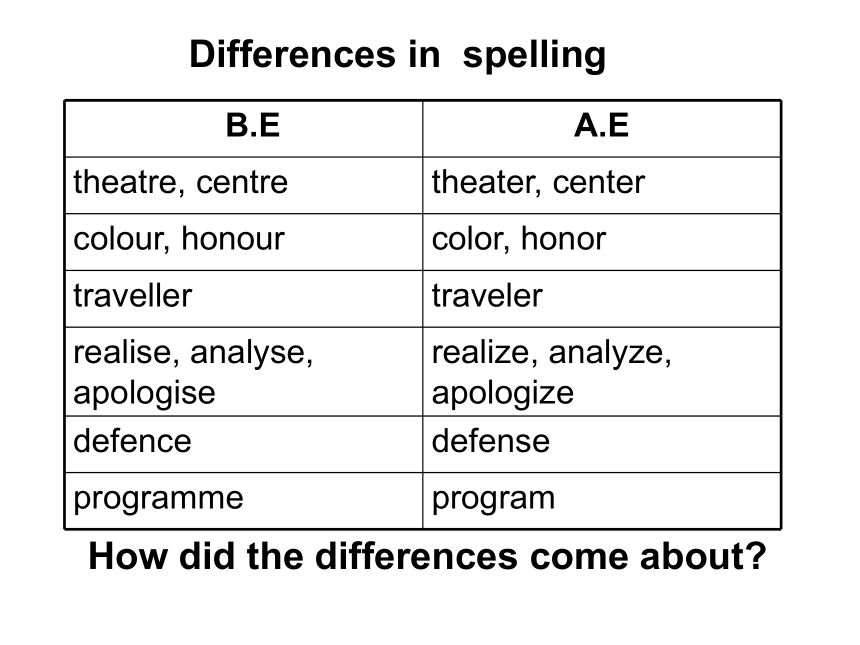
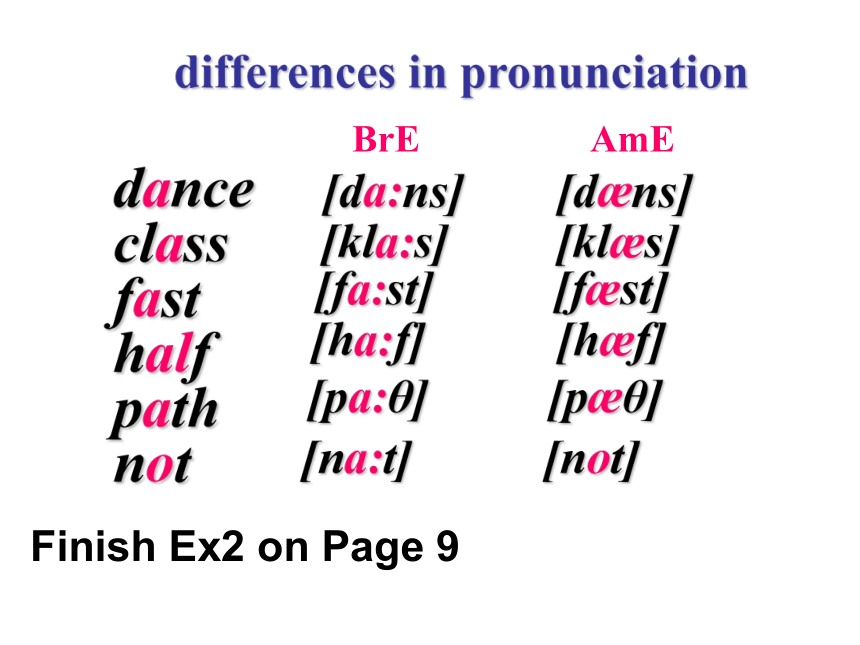

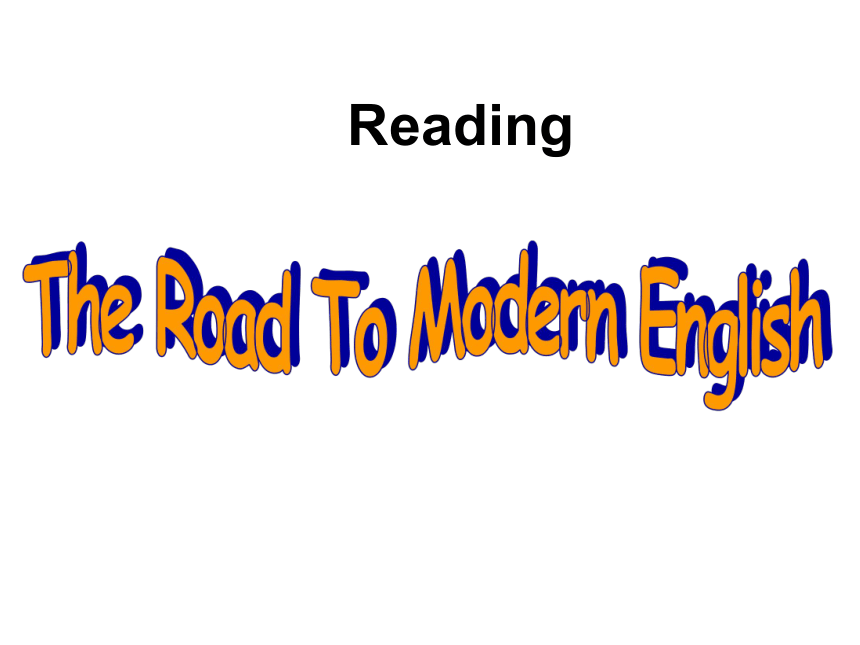
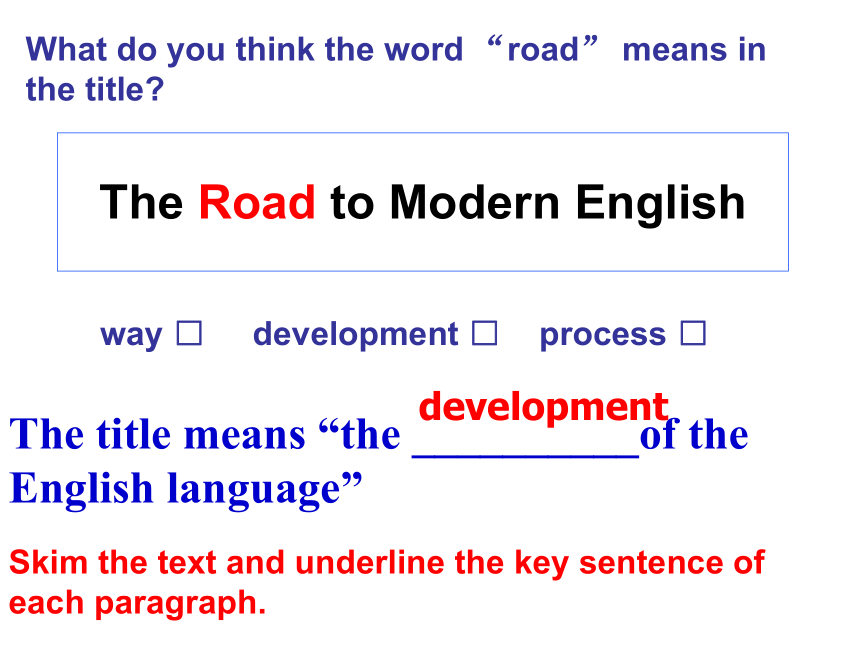
文档简介
(共34张PPT)
Unit
Two
English
around
the
world
Canada
Australia
Britain
warming-up
America
In
which
countries
people
speak
English?
New
Zealand
South
Africa
Ireland
English-speaking
countries:
mother
tongue/
native
language
And
do
you
think
English
around
the
world
is
just
the
same?
There
is
more
than
one
kind
of
English.
In
some
important
ways
they
are
very
different
from
one
another.
They
are
called
world
Englishes.
Brainstorming
world
Englishes
American
English
British
English
Australian
English
Canadian
English
Singapore
English
African
English
Malaysian
English
Indian
English
What
are
the
two
major
kinds
of
English?
British
English
American
English
(VOA)
Br
E
&
Am.E
When
you
hear
two
native
speakers
of
English,
they
may
still
not
speak
the
same
kind
of
English.
Chinese
BrE
AmE
电梯
汽油
公寓
秋天
地铁
大学
厕所
足球
假期
lift
elevator
petrol
flat
apartment
gas,
gasoline
autumn
fall
underground
subway
university
college
toilet
bathroom
football
soccer
holiday
vacation
Differences
in
vocabulary
Differences
in
spelling
B.E
A.E
theatre,
centre
theater,
center
colour,
honour
color,
honor
traveller
traveler
realise,
analyse,
apologise
realize,
analyze,
apologize
defence
defense
programme
program
How
did
the
differences
come
about?
dance
class
fast
half
path
not
[kla:s]
[kl?s]
[fa:st]
[f?st]
[ha:f]
[h?f]
[pa:θ]
[p?θ]
[na:t]
[not]
BrE
AmE
[da:ns]
[d?ns]
differences
in
pronunciation
Finish
Ex2
on
Page
9
Discuss:
1.Do
you
think
it
is
important
for
you
to
learn
English?
Why?
2.Why
do
so
many
people
speak
English?
Reading
The
Road
to
Modern
English
The
title
means
“the
__________of
the
English
language”
development
What
do
you
think
the
word
“road”
means
in
the
title?
way
□
development
□
process
□
Skim
the
text
and
underline
the
key
sentence
of
each
paragraph.
Why
has
English
changed
over
time?
Today,
more
people
speak
English
as
their
first,
second
or
a
foreign
language
than
ever
before.
Native
language
speakers
can
understand
each
other
even
if
they
don’t
speak
the
same
kind
of
English.
Para
1
Para
2
Para
3
Para
5
English
is
spoken
as
a
foreign
language
or
second
language
in
Asia
and
Africa.
Para
4
Finally
by
the
19th
century
the
language
was
settled.
3.Because
languages
don’t
change
often
but
only
when
people
come
into
close
contact.
4.The
government
has
to
use
the
language
of
the
country
which
rules
it.
1.Because
after
the
17th
century,
more
people
began
to
speak
English
as
a
result
of
English
conquering
other
parts
of
the
world.
comprehend:
Finish
EX1
on
page
10
Q5.
Why
does
India
have
a
very
large
number
of
English
speakers?
Q4.
Why
has
English
changed
over
time?
Q3.
Which
country
has
the
largest
number
of
English
speakers?
Q2.
When
and
why
did
English
begin
to
be
spoken
in
other
countries?
Q1.
How
many
people
spoke
English
at
the
end
of
the
16th
century?
Where
did
they
live?
Q1.
How
many
people
spoke
English
at
the
end
of
the
16th
century?
Where
did
they
live?
A1:
About
five
to
seven
million
people
spoke
English
at
that
time.
Nearly
all
of
them
lived
in
England.
A2:
Because
people
from
England
made
voyages
to
conquer
other
parts
of
the
world.
Q3.
Which
country
has
the
largest
number
of
English
speakers?
A3:
China-----only
time
will
tell.
Q2.
When
and
why
did
English
begin
to
be
spoken
in
other
countries?
A4:
It
changes
when
cultures
meet
and
communicate
with
each
other.
A5:
Because
Britain
ruled
India
from
1765
to
1947.
Q5.
Why
does
India
have
a
very
large
number
of
English
speakers?
Q4.
Why
has
English
changed
over
time?
Make
a
timeline
of
the
development
of
English
time
What
happened?
between
about
AD
450
and
1150
The
road
to
modern
English
between
AD
450-1150
between
about
AD
800-1150
The
English
was
spoken
in
England.
It
was
based
more
on
German
than
the
English
we
speak
at
present.
Because
the
people
who
ruled
England
spoke
first
Danish
and
later
French,
English
became
less
like
German.
The
road
to
modern
English
In
the
1600s
In
1620
In
the
18th
century
____________
made
use
of
a
wider
vocabulary
than
ever
before.
Shakespeare
Some
British
settlers
moved
to
America.
Some
British
people
were
taken
to
Australia
too.
English
began
to
be
spoken
in
both
countries
English
is
spoken
in
other
countries
such
as
______________,
______________,
__________,
__________________
________________and
so
on.
The
road
to
modern
English
from
1765-1947
By
the
19th
century
Today
Britain
ruled
India.
Singapore
Malaysia
India
South
Africa
China
English
was
spoken
in
India.
Samuel
Johnson
wrote
his
dictionary.
Noah
Webster
wrote
The
American
Dictionary
of
the
English
language
and
gave
a
separate
identity
to
American
English
spelling.
The
English
language
was
settled.
Two
big
changes
in
English
spelling
happened
:
______
the
English
spoken
in
England
_______________________
(在公元450年到1150年间)was
very
____________
the
English
spoken
______.
It
was
__________(更多的是以…为基础)German
than
the
English
we
speak_______.
______
________
(逐渐地)between
about
AD800
and
1150,
English
became
less
like
German
because
those
who
ruled
England
spoke______
Danish
and______
French.
cloze
test
At
first
between
about
AD
450
and
1150
today
different
from
based
more
on
at
present
Then
first
later
gradually
How
the
English
language
develops
____________(到17世纪)Shakespeare
was
able
to
___________a
wider
vocabulary
than
ever
before.
______________
(后来到了18世纪)
some
British
people
were
taken
to
Australia
too.
English
______(开始)be
spoken
in
both
countries.
_______________
(最后到19世纪)
the
language
was_________(定形).
_________
(在那时)two
big
changes
in
English
spelling
____________.
By
the
1600’s
make
use
of
Later
in
the
18th
century
began
to
Finally
by
the
19th
century
settled
At
that
time
happened
English
______is
_____spoken
as
a
foreign
or
second
language
in
South
Asia.______________(比方说),
India
has
_____________________(大量的)fluent
English
speakers.
English
is
also
spoken
in
Singapore,
Malaysia
and
countries
in
Africa
________
(例如)South
Africa.
Today
_____________
people
learning
English
in
China
is
_________________(迅速增长).
now
also
For
example
a
very
large
number
of
such
as
the
number
of
increasing
rapidly
more
than
1.“超过,多于”、2.“不仅仅是,不只是”。3.more
than+形容词/副词,“非常,十分”,与very同义。4.more...than...意为“与其说……不如说……;
5.no
more
than=only,意为“只有,仅仅”;not
more
than
=at
(the)
most,常用于数词之前,意为“至多,不超过”。
(1)There
is
room
for
_____________________(只能停放三辆车).
(2)She
was
________________________(比……聪明多了)
her
sister.
(3)I’m
__________
(非常)
happy
to
take
you
there
in
my
car.
(4)I
think
Anne
is
_______________________(与其说是不友好,不如说是害羞).
no
more
than
three
cars
far
more
intelligent
than
more
than
more
shy
than
unfriendly
more
than
one
+名词单数,
后面的谓语动词用单数
More
than
one
student
wants
to
go
to
swim.
Both
of
them
are
much
more
than
schoolmates.
They
are
close
friends.
at
the
end
of
在...的尽头;在...的结束的时候(可用于空间或时间方面)
by
the
end
of
到...结束时为止,常用于完成时
in
the
end
最后,终于,不与of
连用(做状语,修饰动词)
1.到去年为止,我们已经学了3年英语了。
By
the
end
of
last
year,
we
had
learned
English
for
three
years.
2.最后,我终于找到了那家商店。
In
the
end,
I
found
that
shop.
We
will
have
finished
the
task
by
the
end
of
next
week.
3。到下个星期末为止,我们会完成这个任务。
because
of+名词/代词/动名词短语/what引导的宾语从句;
Because+句子
He
came
to
work
late
__________he
got
up
late.
He
came
to
work
late
____________
getting
up
late.
The
girl
cried
__________
what
her
friend
had
done
to
her.
because
because
of
because
of
[考例]
The
open-air
celebration
has
been
put
off
______
the
bad
weather.
(浙江
)
A.
in
case
of
B.
in
spite
of
C.
instead
of
D.
because
of
[点拨]
句意为“因为天气恶劣推迟了
露天庆祝会。”
because
of由于,因为;
in
case
of假设,万一;in
spite
of尽管;不管,不顾
instead
of代替,而不是……,故正确
答案为D项。
come
up
走近,上来;
(答案、办法等)被提出;
问题在会议中被提出来了。
The
problem
came
up
in
the
meeting.
People
came
up
with
the
problem
in
the
meeting
.
come
up
with
sth
某人提出(答案、办法等)
be
based
on/upon…以…为基础/依据
base…on/upon:建立在…基础上
present
I
am
not
satisfied
with
the
present
situation.
Eg.这部电影是以事实为基础的。
This
movie
is
based
on
facts.
=
The
director
bases
this
movie
on
facts.
at
present:目前,现在
be
present
at:出席
be
absent
from:缺席
出席会议的人都是重要的领导者。
The
people
present
at
the
meeting
are
very
important
leaders.
So
by
the
1600’s,
Shakespeare
made
use
of
a
wider
vocabulary
than
ever
before.在17世纪,莎士比亚使
用了比以前任何时候更大的词汇量.
“在某世纪某年代”时.年代前要加定冠词the,年代后加s
或者’s,
还可加上early表示早期late表示末期
in
the
1780’s/1780s
in
the
early/late
1980s
make
use
of
=take
advantage
of
make
(good
/
full
/
no
/
little…)
use
of
你必须好好利用任何机会练习英语。
我们能够充分利用我们的资源。
每一分钟应该被好好利用来说流利的英语。
You
must
make
use
of
any
opportunity
to
practise
English.
We
could
make
full
use
of
our
resources.
Every
minute
should
be
made
good
use
of
to
speak
fluent
English.
over
1.在...期间,直至…结束
over?the?years
在这些年
My
grandchildren
will
stay
over
Christmas.
我的孙儿孙女们圣诞节期间将呆在这儿。
2.一面...一面...
They
chatted
over
a
cup
of
coffee.
他们一边喝咖啡一边聊天。
the
former
…the
latter
:前者…后者
1)India
has
____very
large
number
of
fluent
English
speakers…
2)Today
the
number
of
people
learning
English
in
China
_____increasing
rapidly.
a
number
of
+可数名词复数
大量的,许多,作主语时谓语动词用复数)
the
number
of
…的数目/数量(作主语时谓语动词用单数)
a
is
The
number
of
people
invited_____
fifty,but
a
number
of
them______
absent
for
different
reasons.
A
.
were
B.
was
was
were
a
large/
great/
good/small
number
of
+可数名词复数
Unit
Two
English
around
the
world
Canada
Australia
Britain
warming-up
America
In
which
countries
people
speak
English?
New
Zealand
South
Africa
Ireland
English-speaking
countries:
mother
tongue/
native
language
And
do
you
think
English
around
the
world
is
just
the
same?
There
is
more
than
one
kind
of
English.
In
some
important
ways
they
are
very
different
from
one
another.
They
are
called
world
Englishes.
Brainstorming
world
Englishes
American
English
British
English
Australian
English
Canadian
English
Singapore
English
African
English
Malaysian
English
Indian
English
What
are
the
two
major
kinds
of
English?
British
English
American
English
(VOA)
Br
E
&
Am.E
When
you
hear
two
native
speakers
of
English,
they
may
still
not
speak
the
same
kind
of
English.
Chinese
BrE
AmE
电梯
汽油
公寓
秋天
地铁
大学
厕所
足球
假期
lift
elevator
petrol
flat
apartment
gas,
gasoline
autumn
fall
underground
subway
university
college
toilet
bathroom
football
soccer
holiday
vacation
Differences
in
vocabulary
Differences
in
spelling
B.E
A.E
theatre,
centre
theater,
center
colour,
honour
color,
honor
traveller
traveler
realise,
analyse,
apologise
realize,
analyze,
apologize
defence
defense
programme
program
How
did
the
differences
come
about?
dance
class
fast
half
path
not
[kla:s]
[kl?s]
[fa:st]
[f?st]
[ha:f]
[h?f]
[pa:θ]
[p?θ]
[na:t]
[not]
BrE
AmE
[da:ns]
[d?ns]
differences
in
pronunciation
Finish
Ex2
on
Page
9
Discuss:
1.Do
you
think
it
is
important
for
you
to
learn
English?
Why?
2.Why
do
so
many
people
speak
English?
Reading
The
Road
to
Modern
English
The
title
means
“the
__________of
the
English
language”
development
What
do
you
think
the
word
“road”
means
in
the
title?
way
□
development
□
process
□
Skim
the
text
and
underline
the
key
sentence
of
each
paragraph.
Why
has
English
changed
over
time?
Today,
more
people
speak
English
as
their
first,
second
or
a
foreign
language
than
ever
before.
Native
language
speakers
can
understand
each
other
even
if
they
don’t
speak
the
same
kind
of
English.
Para
1
Para
2
Para
3
Para
5
English
is
spoken
as
a
foreign
language
or
second
language
in
Asia
and
Africa.
Para
4
Finally
by
the
19th
century
the
language
was
settled.
3.Because
languages
don’t
change
often
but
only
when
people
come
into
close
contact.
4.The
government
has
to
use
the
language
of
the
country
which
rules
it.
1.Because
after
the
17th
century,
more
people
began
to
speak
English
as
a
result
of
English
conquering
other
parts
of
the
world.
comprehend:
Finish
EX1
on
page
10
Q5.
Why
does
India
have
a
very
large
number
of
English
speakers?
Q4.
Why
has
English
changed
over
time?
Q3.
Which
country
has
the
largest
number
of
English
speakers?
Q2.
When
and
why
did
English
begin
to
be
spoken
in
other
countries?
Q1.
How
many
people
spoke
English
at
the
end
of
the
16th
century?
Where
did
they
live?
Q1.
How
many
people
spoke
English
at
the
end
of
the
16th
century?
Where
did
they
live?
A1:
About
five
to
seven
million
people
spoke
English
at
that
time.
Nearly
all
of
them
lived
in
England.
A2:
Because
people
from
England
made
voyages
to
conquer
other
parts
of
the
world.
Q3.
Which
country
has
the
largest
number
of
English
speakers?
A3:
China-----only
time
will
tell.
Q2.
When
and
why
did
English
begin
to
be
spoken
in
other
countries?
A4:
It
changes
when
cultures
meet
and
communicate
with
each
other.
A5:
Because
Britain
ruled
India
from
1765
to
1947.
Q5.
Why
does
India
have
a
very
large
number
of
English
speakers?
Q4.
Why
has
English
changed
over
time?
Make
a
timeline
of
the
development
of
English
time
What
happened?
between
about
AD
450
and
1150
The
road
to
modern
English
between
AD
450-1150
between
about
AD
800-1150
The
English
was
spoken
in
England.
It
was
based
more
on
German
than
the
English
we
speak
at
present.
Because
the
people
who
ruled
England
spoke
first
Danish
and
later
French,
English
became
less
like
German.
The
road
to
modern
English
In
the
1600s
In
1620
In
the
18th
century
____________
made
use
of
a
wider
vocabulary
than
ever
before.
Shakespeare
Some
British
settlers
moved
to
America.
Some
British
people
were
taken
to
Australia
too.
English
began
to
be
spoken
in
both
countries
English
is
spoken
in
other
countries
such
as
______________,
______________,
__________,
__________________
________________and
so
on.
The
road
to
modern
English
from
1765-1947
By
the
19th
century
Today
Britain
ruled
India.
Singapore
Malaysia
India
South
Africa
China
English
was
spoken
in
India.
Samuel
Johnson
wrote
his
dictionary.
Noah
Webster
wrote
The
American
Dictionary
of
the
English
language
and
gave
a
separate
identity
to
American
English
spelling.
The
English
language
was
settled.
Two
big
changes
in
English
spelling
happened
:
______
the
English
spoken
in
England
_______________________
(在公元450年到1150年间)was
very
____________
the
English
spoken
______.
It
was
__________(更多的是以…为基础)German
than
the
English
we
speak_______.
______
________
(逐渐地)between
about
AD800
and
1150,
English
became
less
like
German
because
those
who
ruled
England
spoke______
Danish
and______
French.
cloze
test
At
first
between
about
AD
450
and
1150
today
different
from
based
more
on
at
present
Then
first
later
gradually
How
the
English
language
develops
____________(到17世纪)Shakespeare
was
able
to
___________a
wider
vocabulary
than
ever
before.
______________
(后来到了18世纪)
some
British
people
were
taken
to
Australia
too.
English
______(开始)be
spoken
in
both
countries.
_______________
(最后到19世纪)
the
language
was_________(定形).
_________
(在那时)two
big
changes
in
English
spelling
____________.
By
the
1600’s
make
use
of
Later
in
the
18th
century
began
to
Finally
by
the
19th
century
settled
At
that
time
happened
English
______is
_____spoken
as
a
foreign
or
second
language
in
South
Asia.______________(比方说),
India
has
_____________________(大量的)fluent
English
speakers.
English
is
also
spoken
in
Singapore,
Malaysia
and
countries
in
Africa
________
(例如)South
Africa.
Today
_____________
people
learning
English
in
China
is
_________________(迅速增长).
now
also
For
example
a
very
large
number
of
such
as
the
number
of
increasing
rapidly
more
than
1.“超过,多于”、2.“不仅仅是,不只是”。3.more
than+形容词/副词,“非常,十分”,与very同义。4.more...than...意为“与其说……不如说……;
5.no
more
than=only,意为“只有,仅仅”;not
more
than
=at
(the)
most,常用于数词之前,意为“至多,不超过”。
(1)There
is
room
for
_____________________(只能停放三辆车).
(2)She
was
________________________(比……聪明多了)
her
sister.
(3)I’m
__________
(非常)
happy
to
take
you
there
in
my
car.
(4)I
think
Anne
is
_______________________(与其说是不友好,不如说是害羞).
no
more
than
three
cars
far
more
intelligent
than
more
than
more
shy
than
unfriendly
more
than
one
+名词单数,
后面的谓语动词用单数
More
than
one
student
wants
to
go
to
swim.
Both
of
them
are
much
more
than
schoolmates.
They
are
close
friends.
at
the
end
of
在...的尽头;在...的结束的时候(可用于空间或时间方面)
by
the
end
of
到...结束时为止,常用于完成时
in
the
end
最后,终于,不与of
连用(做状语,修饰动词)
1.到去年为止,我们已经学了3年英语了。
By
the
end
of
last
year,
we
had
learned
English
for
three
years.
2.最后,我终于找到了那家商店。
In
the
end,
I
found
that
shop.
We
will
have
finished
the
task
by
the
end
of
next
week.
3。到下个星期末为止,我们会完成这个任务。
because
of+名词/代词/动名词短语/what引导的宾语从句;
Because+句子
He
came
to
work
late
__________he
got
up
late.
He
came
to
work
late
____________
getting
up
late.
The
girl
cried
__________
what
her
friend
had
done
to
her.
because
because
of
because
of
[考例]
The
open-air
celebration
has
been
put
off
______
the
bad
weather.
(浙江
)
A.
in
case
of
B.
in
spite
of
C.
instead
of
D.
because
of
[点拨]
句意为“因为天气恶劣推迟了
露天庆祝会。”
because
of由于,因为;
in
case
of假设,万一;in
spite
of尽管;不管,不顾
instead
of代替,而不是……,故正确
答案为D项。
come
up
走近,上来;
(答案、办法等)被提出;
问题在会议中被提出来了。
The
problem
came
up
in
the
meeting.
People
came
up
with
the
problem
in
the
meeting
.
come
up
with
sth
某人提出(答案、办法等)
be
based
on/upon…以…为基础/依据
base…on/upon:建立在…基础上
present
I
am
not
satisfied
with
the
present
situation.
Eg.这部电影是以事实为基础的。
This
movie
is
based
on
facts.
=
The
director
bases
this
movie
on
facts.
at
present:目前,现在
be
present
at:出席
be
absent
from:缺席
出席会议的人都是重要的领导者。
The
people
present
at
the
meeting
are
very
important
leaders.
So
by
the
1600’s,
Shakespeare
made
use
of
a
wider
vocabulary
than
ever
before.在17世纪,莎士比亚使
用了比以前任何时候更大的词汇量.
“在某世纪某年代”时.年代前要加定冠词the,年代后加s
或者’s,
还可加上early表示早期late表示末期
in
the
1780’s/1780s
in
the
early/late
1980s
make
use
of
=take
advantage
of
make
(good
/
full
/
no
/
little…)
use
of
你必须好好利用任何机会练习英语。
我们能够充分利用我们的资源。
每一分钟应该被好好利用来说流利的英语。
You
must
make
use
of
any
opportunity
to
practise
English.
We
could
make
full
use
of
our
resources.
Every
minute
should
be
made
good
use
of
to
speak
fluent
English.
over
1.在...期间,直至…结束
over?the?years
在这些年
My
grandchildren
will
stay
over
Christmas.
我的孙儿孙女们圣诞节期间将呆在这儿。
2.一面...一面...
They
chatted
over
a
cup
of
coffee.
他们一边喝咖啡一边聊天。
the
former
…the
latter
:前者…后者
1)India
has
____very
large
number
of
fluent
English
speakers…
2)Today
the
number
of
people
learning
English
in
China
_____increasing
rapidly.
a
number
of
+可数名词复数
大量的,许多,作主语时谓语动词用复数)
the
number
of
…的数目/数量(作主语时谓语动词用单数)
a
is
The
number
of
people
invited_____
fifty,but
a
number
of
them______
absent
for
different
reasons.
A
.
were
B.
was
was
were
a
large/
great/
good/small
number
of
+可数名词复数
